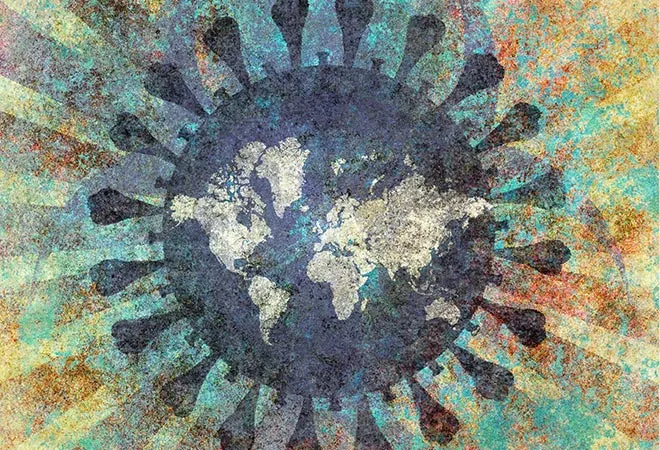
As the Covid-19 virus continues to spread globally, the news media and social media are flooded with the horrors the deadly pandemic has caused. We’ve seen mass graves in Europe, while China contained over 50 million people in a single province, India has put 1.3 billion people and South Africa 58 million under lockdown. With all the technology and predictive gadgets at our disposal, something as medieval as a virus, with symptoms resembling the common cold or seasonal influenza, has ravaged the world and forced humanity to its knees.
There was early praise for the exceptional Chinese system of governance at the outset of the lockdown. As a result, there were suggestions that only authoritarian states would survive the pandemic. Interestingly, what we have learned is that liberal, constitutional democracies like India and South Africa can effectively muster their populations to voluntarily surrender certain freedoms and liberties, without compromising their rights. The leadership of governments has been phenomenal in most cases; South African President Cyril Ramaphosa and his cabinet prioritising human life over everything else was a bold and courageous move that may well prove successful.
World leaders and leading scientists are grappling with the realities that we confront. It is a dangerous time in the journey of Covid-19 where we may be tempted to question the severity of the virus or assume that the worst is over. The truth is that we still do not know the greatest threat that Covid-19 will present. It preys on the natural human instinct of social proximity, and this invariably turns strength into humankind’s greatest weakness.
Diplomacy, front and centre
In the diplomatic arena, consular officers and experts in migration are auditing and exchanging notes on the impact of Covid-19 on their work. The nexus between public health and national (and international) security has never come so frighteningly close, at least in the last century. While all of this was going on, countries started to repatriate their citizens. These realities have since become the most glaring example of the centrality of a professional, crisis-ready consular corps for any foreign service in the 21st century. The consular officer is required to function in a global environment where people travel more frequently, in higher numbers, and with more risk across the globe.
In South Africa, the repatriation is being managed at the highest levels, where an inter-ministerial ‘Command Council’ chaired by the president was convened to take charge of the decision-making process on the plight of South Africans abroad, among other things. This tells us that this area of diplomacy will be given more considerable attention and prominence in South Africa and many parts of the world.
Consular and political officers are increasingly expected to forge broader and more relevant networks to manage crises, but they are also expected to maximise opportunities. Traditional diplomacy is increasingly embracing non-traditional, non-state actors as part of its broader network of engagement. Large multinational cooperations, enterprises involved in niche areas, civil society actors in different parts of the world, international fund managers, banks, and mega foundations have significant amounts of global influence and reach. This may well be the ideal infrastructure that is incorporated into long term consular operations.
However, the darker side cannot be ignored. Threats to the state are also incubated among other kinds of non-traditional actors. These are often sinister, opaque and include, but are not limited to, transnational crime, violent extremism and organisations representing radical anarchic ideologies.
These realities propel the consular official to the centre of multilateral and multinational operations ranging from refugees, stranded citizens, conflict areas and victims of transnational crime. It is at this level that the solidarity that we expect in international relations and interstate communication becomes part of our existence. The foreign ministry becomes the space where cooperation and solidarity are needed to protect the state and advance its interests. This is the only, non-comparative way to organise the chaos of disruption in the global terrain.
Human solidarity
History is crucial to navigate safely into the future. But the current situation is without precedent, and so we do not have the privilege of hindsight. We have experienced mass pandemics through the centuries, but Covid-19 has emerged in a global scenario that is already challenged by new realities, fractured institutions, complex disruptions and unpredictability. The ongoing human solidarity initiatives that are being led by our governments, civil society and citizens in general, is critical to protect the most vulnerable in our communities from the virus, hunger, grinding poverty, and in the end contain, its potential to damage.
The Covid-19 pandemic reminds us that we are incredibly vulnerable as a species. The relatively sudden disruption of travel, communication and individual lifestyles have brought to the fore the challenges that humanity has grappled with since the end of the Second World War. The need for reform in the global governance architecture has never been so clear, while the global balance of forces has become more dynamic and increasingly unstable and unpredictable. For the last decade, our multilateral and global governance institutions have been under considerable strain. The US’s decision to
withdraw funding to the WHO has demonstrated the vulnerability of our international institutions.
South Africa’s response to the Covid-19 pandemic — declaring a disaster, enforcing a strict lockdown, stopping all domestic and international travel, halting all non-essential commercial activity, and mass testing and screening — is in line with WHO guidelines. The WHO has done well to coordinate and guide South Africa and other countries on the science-backed do’s and don’ts to deal with the crisis. This capacity must be strengthened and protected for now and in the future.
On 16 April, members of the Alliance for Multilateralism, convened in September 2019,
signed a statement that called for “enhanced international cooperation and worldwide solidarity” while stressing that Covid-19 was a wakeup call for multilateralism. The Alliance highlighted five challenges that the pandemic poses for the international community: health, information (including misinformation and fake news), financial, economic, and prevention. The increasing shift in favour of ‘network diplomacy’ within the UN system may prove to be a necessary method to reignite cooperation, solidarity and multilateralism to ensure its relevance in the 21
st century.
Cooperation is crucial
It is at times like this that our need for multilateral and international cooperation becomes critical to our survival. Some might argue that the advance of the Covid-19 virus might negatively impact globalisation. But recent acts demonstrate the inherent will among most states to cooperate and collaborate.
Solidarity and cooperation, when confronting an existentialist threat is crucial to the survival of humankind. How foreign ministries organise their departments will be central to shaping the international agenda. The Covid-19 pandemic is teaching us that the narrow corridor between self-interest and altruism lies in our will to work together. We can define that work either in terms of solidarity or cooperation, or our narrow self-interest. Either way, our very survival and existence may well depend on our approach to reform and protect the global architecture.
The views expressed above belong to the author(s). ORF research and analyses now available on Telegram! Click here to access our curated content — blogs, longforms and interviews.



 As the Covid-19 virus continues to spread globally, the news media and social media are flooded with the horrors the deadly pandemic has caused. We’ve seen mass graves in Europe, while China contained over 50 million people in a single province, India has put 1.3 billion people and South Africa 58 million under lockdown. With all the technology and predictive gadgets at our disposal, something as medieval as a virus, with symptoms resembling the common cold or seasonal influenza, has ravaged the world and forced humanity to its knees.
There was early praise for the exceptional Chinese system of governance at the outset of the lockdown. As a result, there were suggestions that only authoritarian states would survive the pandemic. Interestingly, what we have learned is that liberal, constitutional democracies like India and South Africa can effectively muster their populations to voluntarily surrender certain freedoms and liberties, without compromising their rights. The leadership of governments has been phenomenal in most cases; South African President Cyril Ramaphosa and his cabinet prioritising human life over everything else was a bold and courageous move that may well prove successful.
World leaders and leading scientists are grappling with the realities that we confront. It is a dangerous time in the journey of Covid-19 where we may be tempted to question the severity of the virus or assume that the worst is over. The truth is that we still do not know the greatest threat that Covid-19 will present. It preys on the natural human instinct of social proximity, and this invariably turns strength into humankind’s greatest weakness.
As the Covid-19 virus continues to spread globally, the news media and social media are flooded with the horrors the deadly pandemic has caused. We’ve seen mass graves in Europe, while China contained over 50 million people in a single province, India has put 1.3 billion people and South Africa 58 million under lockdown. With all the technology and predictive gadgets at our disposal, something as medieval as a virus, with symptoms resembling the common cold or seasonal influenza, has ravaged the world and forced humanity to its knees.
There was early praise for the exceptional Chinese system of governance at the outset of the lockdown. As a result, there were suggestions that only authoritarian states would survive the pandemic. Interestingly, what we have learned is that liberal, constitutional democracies like India and South Africa can effectively muster their populations to voluntarily surrender certain freedoms and liberties, without compromising their rights. The leadership of governments has been phenomenal in most cases; South African President Cyril Ramaphosa and his cabinet prioritising human life over everything else was a bold and courageous move that may well prove successful.
World leaders and leading scientists are grappling with the realities that we confront. It is a dangerous time in the journey of Covid-19 where we may be tempted to question the severity of the virus or assume that the worst is over. The truth is that we still do not know the greatest threat that Covid-19 will present. It preys on the natural human instinct of social proximity, and this invariably turns strength into humankind’s greatest weakness.
 PREV
PREV


